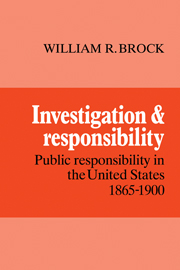Book contents
- Frontmatter
- Contents
- Dedication
- Preface
- 1 Public responsibility
- 2 Theory and practice
- 3 Public responsibility and the law
- 4 The charities of the State
- 5 The boards of public health
- 6 The bureaus of labor statistics
- 7 The railroad commissions
- 8 Toward the future
- Appendix 1 State agencies: some representative samples
- Appendix 2 Checklist of reports issued by boards of state charities, boards of public health, bureaus of labor statistics, and railroad commissions, 1865–1900
- Essay on sources and historiography
- Bibliography
- Index
7 - The railroad commissions
Published online by Cambridge University Press: 03 May 2010
- Frontmatter
- Contents
- Dedication
- Preface
- 1 Public responsibility
- 2 Theory and practice
- 3 Public responsibility and the law
- 4 The charities of the State
- 5 The boards of public health
- 6 The bureaus of labor statistics
- 7 The railroad commissions
- 8 Toward the future
- Appendix 1 State agencies: some representative samples
- Appendix 2 Checklist of reports issued by boards of state charities, boards of public health, bureaus of labor statistics, and railroad commissions, 1865–1900
- Essay on sources and historiography
- Bibliography
- Index
Summary
Railroads presented the most formidable problem for society. Never before had private decisions entailed so many public consequences; never had public responsibility been called upon the shoulder such extensive powers of regulation. They presented in addition a question of such complexity that it has been as much misunderstood by later writers as it was by contemporaries.
Indeed there was not one railroad problem but several. At one stage railroads were desperately needed; counties, cities and towns spared no effort to persuade the companies to divert main lines or build branches; money for railroad bonds was raised locally and handed over with few conditions attached; rights of way were generously conceded; legislatures granted charters which gave corporations the widest possible latitude, often including the power to fix rates without public supervision. Parts of many western states remained in this condition until late in the century and produced a curious alliance against regulation between giant corporations and representatives from the poorest districts. Men who desperately hoped for railroads to be built readily succumbed to the argument that hostile legislation would put an end to construction, while charters which lightly conceded exclusive rights remained to plague future discussion of the railroad problem.
Once constructed a railroad might have a monopoly of communication between a district and its markets, and at this stage pressure of a quite different kind was generated. Railroads were accused of raising rates to an extortionate level, of charging far more where there was no competition than elsewhere, and of allowing services and facilities to deteriorate.
- Type
- Chapter
- Information
- Investigation and ResponsibilityPublic Responsibility in the United States, 1865–1900, pp. 185 - 218Publisher: Cambridge University PressPrint publication year: 1984



